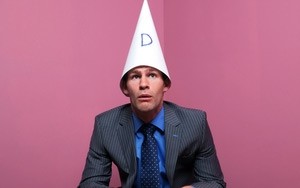The movie Chef, directed by and starring Jon Favreau as Chef Carl Casper, is more than just an intimate and entertaining film by the man who brought Iron Man to the silver screen. It’s actually a fantastic crash-course in new media, seen through the eyes of the uninitiated.
Casper is fed up with the restaurant he works for—when preparing a daring menu that would showcase his considerable talents for a restaurant critic who writes for a powerful blog, the owner (Dustin Hoffman) forces him to serve up his “classics”: unadventurous fare such as French onion soup and molten lava cake.
After receiving a negative review, Casper’s staff keeps reminding him not to worry about Twitter. However, that makes the titular chef more curious about what he’s supposed to be ignoring, so he asks his 10-year-old son if he knows how to get on the popular social media site. What ensues is an adventure in new media.
Here are a few things we learned through the eyes of Chef Carl Casper:
- Bloggers wield a great deal of power and should be treated with the same veneration as traditional media.
The landscape of media has changed, and many enviable careers have been launched via blogs, YouTube channels, and Instagram accounts. In fact, Vine, which allows users to post six-second videos, has made actual celebrities out of those who create brief content for the masses. So, even though a person’s blog may not sounds terribly special to those unfamiliar with it, its writer could have a huge following and, therefore, a massive amount of influence—and should be treated accordingly.
- Everyone is a reporter.
When Chef Casper has a meltdown of epic proportions, everyone in the restaurant records it on their smartphones, and, within hours, the video has gone viral. As frightening a prospect as it may seem, everyone is always being watched—and, often, they are also being recorded. One has to be on their best behavior when in public; otherwise, their own meltdown may end up online to be viewed by millions.
- Once Pandora’s Box has been opened, it is impossible to try to stuff the powerful forces back in.
When Chef Casper consults with his ex-wife’s publicist, and he asks her why she can’t just pull the video down, she tells him that even if she could convince one site to take one clip down, there would still be other clips on other sites. When he mentions lawyers, she warns him that lawyering up will create an even bigger problem; “You threatening them with lawyers builds on a story that’s already gotten a lot of play, and you’ve got another week of headlines.” An attempt at self-defense can actually exacerbate the problem, so it’s best not to let it get out of hand in the first place.
- A crisis is a dangerous opportunity.
The publicist Casper talks to tells him he can “lean into it and work it for all it’s worth, or go underground and wait until the storm passes.” The cyclone of media surrounding a viral video can offer someone ways to take advantage of those fifteen minutes of fame; Casper finds himself given opportunities for Hell’s Kitchen and getting paid to tweet. In the end, he rejects them, but his son leverages the followers he gained as a result of the crisis to help Casper build a new business.
- The storm often passes faster than you might think.
Though the publicist tells Casper that everything lives online forever, she also says, “but there is so much news out there, and it is so fast, and there’s so much white noise, nobody remembers anything.” Even a crisis that seems to shatter a person’s world can be relatively short-lived, and videos that were viral sensations one day are forgotten the next. For some, this will be met with relief; those hoping to leverage the situation to their advantage, however, must act quickly before they lose their place in the spotlight.
- A robust social media strategy can be a vital tool for a budding business.
Chef Casper’s son reaches people through a variety of platforms and media, to help promote his new food truck. He utilizes a combination of photos, text, videos, and geotagging to build a following across Vine, Twitter, and Facebook, and helps his father’s new business become a success.
Chef teaches valuable lessons concerning new media to the Internet-savvy and the uninitiated alike. By creating a story in which characters’ lives are heavily influenced by social media and the flurry that can surround a viral video scandal, Favreau turns the lens onto our society in a keen and insightful manner. The result is a cautionary tale of sorts: new media can be like fire and when mishandled, it can burn—but when leveraged correctly, it can also be a more powerful tool than one ever imagined.
(162)
Report Post





